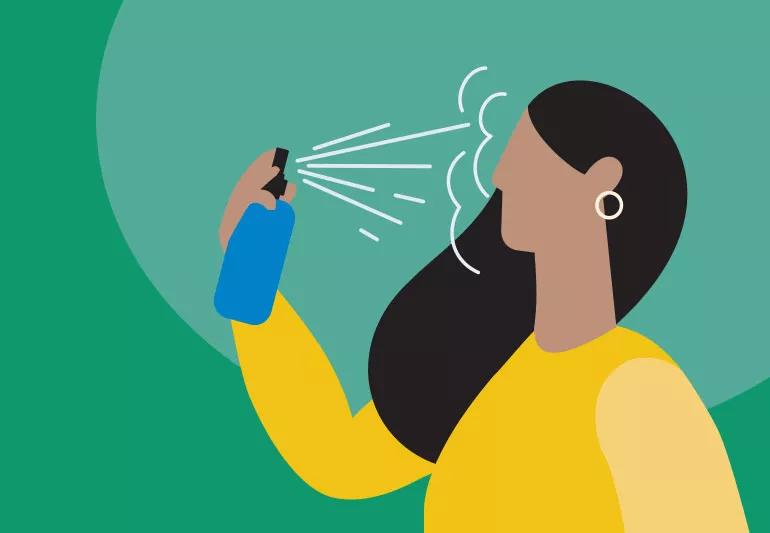Skin care product can help with acne and fight COVID-19

A tough-sounding acid that’s a superhero in the fight against COVID-19 and gentle enough to use on your face to treat acne? It might sound like the stuff of comic book legend, but it’s real and ready for your medicine cabinet.
Advertisement
Cleveland Clinic is a non-profit academic medical center. Advertising on our site helps support our mission. We do not endorse non-Cleveland Clinic products or services. Policy
The buzz surrounding hypochlorous acid (HOCl) grew by leaps and bounds over the past year given its verified power as a disinfectant against COVID-19.
The hard-core cleaner, however, is also gaining marquee status as an über-sensitive skin care product. For the story behind this miracle product, we turn to dermatologist Shilpi Khetarpal, MD.
Let’s start with a basic fact: HOCl exists in your body. It’s created by white blood cells as a defense system against infection, bacteria and general ickiness.
HOCl attacks invading pathogens, breaking down the cell walls before destroying unhealthy invaders. The antimicrobial acid is lethally effective in carrying out its protective mission. (Think of it as your own internal Batman.)
“It’s your body’s natural response to bacteria, and it is very effective at its job,” says Dr. Khetarpal.
So how does it end up being mass-produced for cleaning supplies and skin care products? Well, chemists long ago cracked the code to make HOCl by using electrolysis to break down a simple saltwater solution.
More recently, however, manufacturing advancements allowed HOCl to be made in larger quantities with longer shelf life – a key to more widespread use.
Skin is incredibly tough and durable – a necessity given its role as an outer barrier protecting your inner workings. That front-line role, however, leaves your skin vulnerable to cuts, scrapes and all the bad stuff it’s working to keep out.
Advertisement
Dr. Khetarpal says that HOCl offers your besieged skin a little backup by working to:
The best part, though? HOCl is nontoxic and handles this hard work while being incredibly mild on your skin. That gentleness is a byproduct of it being naturally produced by your body’s immune system.
“It’s great for sensitive skin,” notes Dr. Khetarpal. “It’s not going to give you the dryness, burning or irritation of other products [such as alcohol].”
When it comes to at-home use, HOCl typically delivers its benefits by the squirt. Sprays featuring the cleaning agent are widely available. Most are marketed for use on your face, with a focus on treating acne and eczema.
HOCl can be found in other forms, too, including creams and serums.
Products with HOCl can be incorporated into a daily skin maintenance routine to remove bacteria, says Dr. Khetarpal. Sprays also can be used as a quick-hit, on-the-go defense against COVID-19.
HOCl is not a substitute for a basic washing and scrubbing, though. Think of it more like an extra line of defense.
HOCl is billed as being 100x more powerful than bleach when it comes to fighting bacteria. (Yes, it’s that potent.) So knowing that, it’s really OK to mist the acid over your face without worrying about melting your skin?
“There really isn’t a risk,” says Dr. Khetarpal. “It’s safe to use.”
Dr. Khetarpal advises that you make sure to verify a product with HOCl is billed for skin care before using it on yourself. If you have sensitive skin, stay away from HOCl products with fragrance.
Avoid ingesting HOCl and keep it out of your eyes, says Dr. Khetarpal. Always follow instructions on the product, too.
Advertisement

Sign up for our Health Essentials emails for expert guidance on nutrition, fitness, sleep, skin care and more.
Learn more about our editorial process.
Advertisement

Although it could be used as a moisturizer, this new trend is not recommended

It’s a great disinfectant for around your home, but not for your skin

Changes in texture, smell, color and performance are signs it’s time to throw the cosmetic item away

Strengthening your skin barrier, simple routines and minimizing products are ongoing, popular trends

Moisturizing, running a humidifier and adjusting your showers may help keep itchiness and irritation at bay

Glycolic acid benefits skin tone, texture and pigmentation by exfoliating dead skin

Some gentle soap and warm water go a long way when you’re washing these cosmetic tools regularly

New formulas are less drying and contain water-based and skin-loving ingredients

Even small moments of time outdoors can help reduce stress, boost mood and restore a sense of calm

A correct prescription helps your eyes see clearly — but as natural changes occur, you may need stronger or different eyeglasses

Both are medical emergencies, but they are very distinct events with different causes